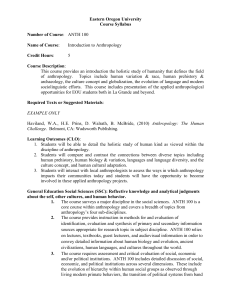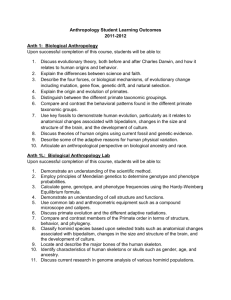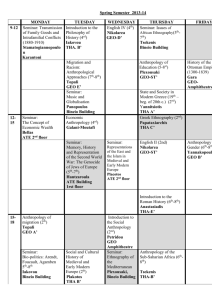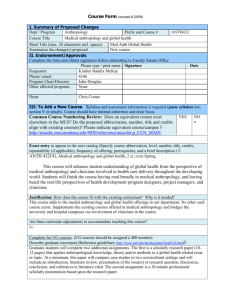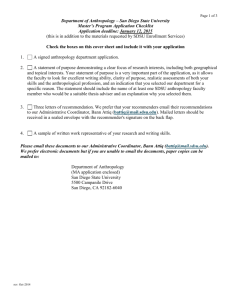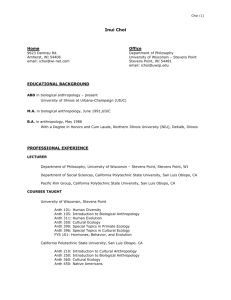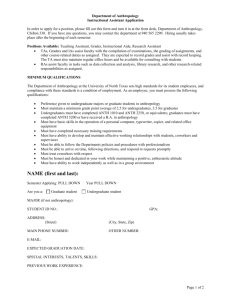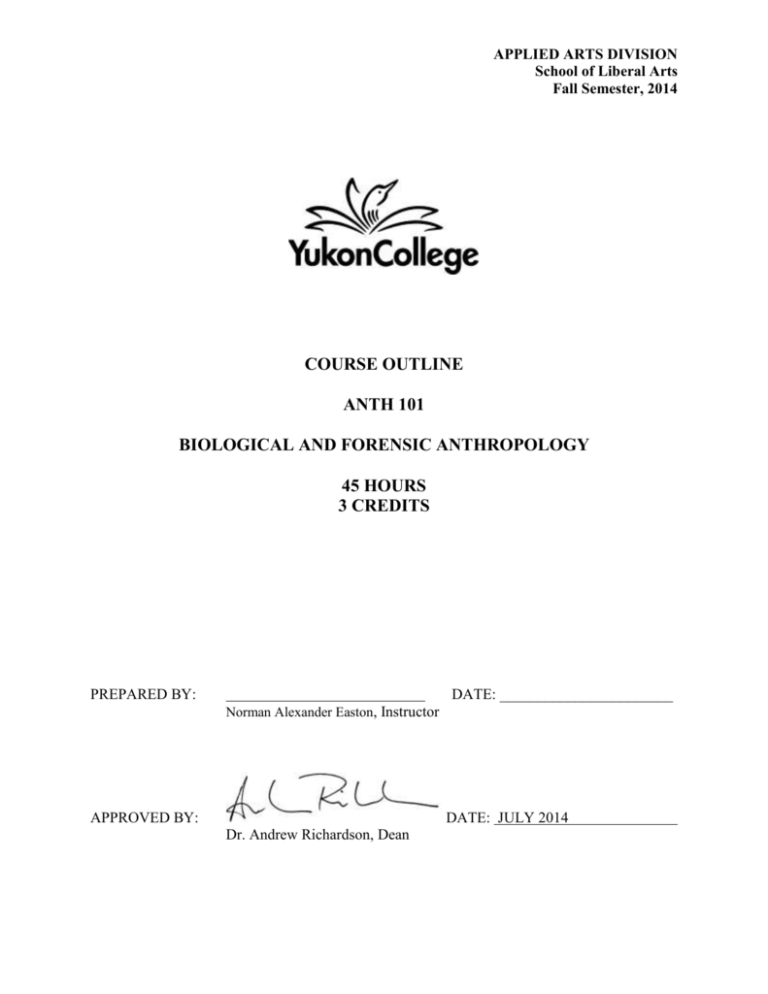
APPLIED ARTS DIVISION
School of Liberal Arts
Fall Semester, 2014
COURSE OUTLINE
ANTH 101
BIOLOGICAL AND FORENSIC ANTHROPOLOGY
45 HOURS
3 CREDITS
PREPARED BY:
DATE: _______________________
Norman Alexander Easton, Instructor
APPROVED BY:
DATE: JULY 2014
Dr. Andrew Richardson, Dean
YUKON COLLEGE
Copyright July, 2014
All right reserved. No part of this material covered by this copyright may be reproduced or
utilized in any form or by any means, electronic or mechanical, traded, or rented or resold,
without written permission from Yukon College.
Course Outline prepared by Norman Alexander Easton, July 2014.
Yukon College
P.O. Box 2799
Whitehorse, YT
Y1A 5K4
APPLIED ARTS DIVISION
Biological and Forensic Anthropology
3 Credit Course
Fall Semester, 2014
BIOLOGICAL AND FORENSIC ANTHROPOLOGY
INSTRUCTOR: Norman Alexander Easton, MA OFFICE HOURS: After class
OFFICE LOCATION: A2410
CLASSROOM: Lecture – A2101, Lab A2801
E-MAIL: northeaston@gmail.com
TIME: Lecture 9:00-10:30am, Lab 10:30-12
TELEPHONE: Office: 668-8770;
Home: 393-8012
DATES: Lecture M/W, Lab W
COURSE DESCRIPTION
This course provides a broad review of the principles and facts of human evolution and
adaptations. The first portion of the course examines the biological principles of evolutionary
theory and our taxonomic relationship with the primates. The second portion will focus on the
evidence for the evolution of humans in the existing fossil record. The latter portion of the
course will examine human variation and practical forensic anthropology. Seminars will
discuss philosophical and methodological issues within the discipline, while laboratory
assignments will develop students’ technical skills in the application of theory to practical
problems.
PREREQUISITES
None
EQUIVALENCY OR TRANSFERABILITY
UBC ANTH 140 (3)
SFU ARCH 131 (3)
UVIC ANTH 100L (1.5)
UAF ANTH 103 (3)
UAS Elec. (3)
UR ANTH 250 (3)
TRU ANTH 1110 (3)
TWU ANTH 100L (3)
CAMO ANTH 100L (3)
AU ANTH 278 (3)
UNBC ANTH 1XX (3); Yukon College ANTH 101/103 = UNBC 102 (3) and ANTH 1XX (3)
LEARNING OUTCOMES
With conscientious application, upon completion of this course students will:
Understand the philosophy and methods of the scientific exploration of our
evolutionary history through time.
Understand the biological mechanisms of inheritance, adaptations, and evolutionary
change.
Understand the principles of systematics, taxonomy and our primate heritage.
Have a broad understanding of the evidence for and theories of explanation of the
evolutionary history of the Genus Homo.
Gain proficiency in basic laboratory methods related to the treatment, measurement,
identification, and analysis of skeletal remains.
COURSE FORMAT
Classes will consist of lectures and seminar discussions on the current week’s topic and weekly
laboratory lectures and assignments.
COURSE REQUIREMENTS/EVALUATION:
Evaluation:
Grades for ANTH 101 will be assigned based on the percentile equivalent of student
achievement in the following:
Attendance and Participation
Laboratory Assignments
Seminar Presentation
Final Exam
Total Marks
30 marks
120 marks
30 marks
120 marks
300 marks
Attendance and Participation
Regular attendance will be graded out of 10 marks; informed participation in class discussions
will be worth up to 20 marks.
Laboratory Assignments
Students will undertake a weekly laboratory assignment consisting of an introductory lecture
and practical instruction in methods followed by a practical application to a set of questions
provided in the course lab manual and workbook. Scores on each lab will be prorated at the
equivalent of 10 course marks.
Term Seminar Assignments
Taking class size into account, students will work in teams to lead two to three seminar
discussions on the topics contained in the course text The Alternative Introduction to
Biological Anthropology. This will involve presenting a 5 – 10 minute overview of the
principle issues presented in the assigned chapter and guiding further discussion on the topic
with Instructor input.
Final Exam
A comprehensive final examination will be written during the examination period at the end of
term. A preview of the examination, including required and alternative essay responses will be
provided to students prior to the examination.
REQUIRED TEXTBOOKS/MATERIALS
Kelly, R. L., & Thomas, D. H. (2013). Archaeology (6th ed.). Belmont, CA:
Wadsworth/Cengage Learning.
Marks, J. (2011). The alternative introduction to biological anthropology. New York: Oxford
University Press.
Williams, F. L. (2010). Exploring biological anthropology: an integrated lab manual and
workbook. New York: Oxford University Press.
Additional supplementary readings on recent discoveries and issues may also be assigned.
PLAGIARISM
Plagiarism is a serious academic offence. Plagiarism occurs when students present the
words of someone else as their own. Plagiarism can be the deliberate use of a whole piece
of another person’s writing, but more frequently it occurs when students fail to
acknowledge and document sources from which they have taken material. Whenever the
words, research or ideas of others are directly quoted or paraphrased, they must be
documented according to an accepted manuscript style (e.g., APA, CSE, MLA, etc.).
Resubmitting a paper which has previously received credit is also considered plagiarism.
Students who plagiarize material for assignments will receive a mark of zero (F) on the
assignment and may fail the course. Plagiarism may also result in dismissal from a
program of study or the College.
ACADEMIC ACCOMODATION
Reasonable accommodations are available for students requiring an academic
accommodation to fully participate in this class. These accommodations are available for
students with a documented disability, chronic condition or any other grounds specified in
section 8.0 of the Yukon College Academic Regulations (available on the Yukon College
website). It is the student’s responsibility to seek these accommodations. If a student
requires an academic accommodation, he/she should contact the Learning Assistance
Centre (LAC) at (867) 668-8785 or lassist@yukoncollege.yk.ca.
WRITING CENTRE
All students are encouraged to make the Writing Centre a regular part of the writing process
for coursework. Located in C2231 (adjacent the College Library), the Writing Centre offers
half-hour writing coaching sessions to students of all writing abilities. Coaching sessions are
available in person and through distance technologies (e.g., email plus Skype or phone). For
further information or to book an appointment, visit the Centre's website:
www.yukoncollege.yk.ca/student_info/pages/writing_centre.
ACADEMIC CALENDAR COURSE DESCRIPTION
A general introduction to the field of biological anthropology, its contributions to our
understanding of human evolution and behaviour, and its application within forensic science.
Students must also register in ANTH 101L, the mandatory lab component of this course.
ANTHROPOLOGY 101- INTRODUCTION TO BIOLOGICAL ANTHROPOLOGY
CLASS SYLLABUS
N. A. Easton, Instructor (Fall 2014)
Seminar Classes: Tues/Thurs 10:30 – Noon
Week
1
2
3
4
5
6
7
8
9
10
11
12
13
Labs: Wed 10:30 - Noon
Topic
Introduction to Biological Anthropology
Seminar: Ch. 1Anthropology
Lab 1 (1)
Principles of the Scientific Understanding of the Past
Seminar: Ch. 2 Science
Lab 2 (4)
Principles of Evolution
Seminar: Ch. 3 Evolution
Lab 3 (3)
Geology, Systematics, and Taxonomy
Seminar: Ch. 6 Systematics
Lab 4 (7)
Primate Taxonomy and Behaviour
Seminar: Ch. 7 Taxonomy
Lab 5 (6)
Evolution of the Primate Order
Seminar: Ch. 9 Adaptation
Lab 6 (8)
Evolution of the Hominins Family
Seminar: Ch. 10 Paleoanthropology Lab 7 (10)
Evolution of Early Homo Genus
Seminar: Ch. 11 Early Diversification Lab 8 (11)
Emergence of Modern Homo sapiens
Seminar: Ch. 8 Primatology
Lab 9 (13)
Neandertals
Seminar: Ch. 12 Neandertal
Lab 10 (12)
Human Migrations, Adaptations, and Variation
Seminar: Ch. 13 Race?
Lab 11 (14)
Forensic Anthropology I
Seminar: Ch. 5 Micro-Evolution
Lab 12 (15)
Forensic Anthropology II
Readings
Ch. 1
Ch. 2
Ch. 3
Ch. 4
Ch. 5
Ch. 5
Ch. 6
Ch. 7
Ch. 8
Ch. 9
Ch. 10 & 11
Ch 12
Ch. 12
ANTHROPOLOGY 101- INTRODUCTION TO BIOLOGICAL ANTHROPOLOGY
LAB SYLLABUS
Week Lab
1
2
3
4
5
6
7
8
9
10
11
12
13
Lab 1
Lab 2
Lab 3
Lab 4
Lab 5
Text
Chapter
(1)
(4)
(3)
(7)
(6)
Topic
Epistemology and the Scientific Method
Human Osteology
Genetics
Dating Methods and Paleoecology
Primate Classification and Comparative
Anatomy
Lab 6
(8)
Primate Evolution
Lab 7
(10)
Australopithecus
Lab 8
(11)
Early Homo and Homo Erectus
Lab 9
(13)
Modern Human Origins
Lab 10 (12)
Archaic Homo Sapiens
Lab 11 (14)
Human Variation
Lab 12 (15)
Forensic Anthropology
Lab Ketchup and Review

